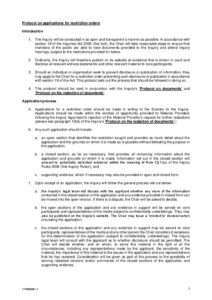Protocol on applications for restriction orders
Published:
Introduction (Back to top)
- The Inquiry will be conducted in as open and transparent a manner as possible. In accordance with section 18 of the Inquiries Act 2005 (‘the Act’), the Chair will take reasonable steps to ensure that members of the public are able to view documents provided to the Inquiry and attend Inquiry hearings, subject to the restrictions provided for below.
- Ordinarily, the Inquiry will therefore publish on its website all evidence that is shown in court and disclose all relevant witness statements and other relevant material to core participants.
- Should an individual or organisation seek to prevent disclosure or publication of information, they may apply to the Chair for a restriction order preventing such disclosure or publication in accordance with section 19 of the Act. This protocol sets out the process that should be followed in doing so.
- This protocol should be read in conjunction with the Inquiry’s ‘Protocol on documents‘ and ‘Protocol on the redaction of documents‘.
Application process (Back to top)
- Applications for a restriction order should be made in writing to the Solicitor to the Inquiry. Applications should be made within the window of opportunity provided to Material Providers following the Inquiry legal team’s rejection of the Material Provider’s request for further redactions (please see paragraph 10(b) of the Inquiry’s ‘Protocol on the redaction of documents’.)
- Any such application should include:
- an open section that identifies the restriction sought and provides as much detail about the application and the grounds on which it is made as is possible without defeating the purpose of the application;
- a closed section, as far as necessary, that provides all remaining information about the application and grounds on which it is made. Information set out in the closed section will amount to ‘potentially restricted evidence’ within the meaning of Rule 12(1)(a) of the Inquiry Rules 2006 (‘the Inquiry Rules’); and
- supporting evidence, which if necessary may also be provided in open and closed form.
- Upon receipt of an application, the Inquiry will follow the general process set out below:
- the Inquiry’s legal team will discuss with the applicant whether any more of the information contained in the closed section of the application and any evidence provided in closed form can be moved into the open version. If there is a dispute, the Chair will be asked to decide;
- the open sections of the application and any evidence in support will be served on core participants and representatives of the media subject to confidentiality undertakings. They may also be published on the Inquiry’s website. The Chair may issue a ‘minded to’ decision when circulating the application;
- the closed sections of the application and any evidence in support may be served on core participants, representatives of the media and any other person the Chair considers it necessary for the determination of the application (subject to confidentiality undertakings). The Inquiry legal team will consult with the applicant as to whether disclosure should be permitted. The Chair will decide whether, and on whom, to serve this material in the light of all the circumstances, including any representations made by the applicant, the sensitivity of the material, the importance of the material to the issues in the application and any representations that he has received. Consideration will be given as part of this process to the possibility of serving redacted versions and/or summaries of the closed sections of the application and supporting evidence.
- the Chair will invite core participants, representatives of the media and any other person served with the application to file written submissions in response to the application (and ‘minded to’ decision, if applicable). These submissions may be published on the Inquiry’s website;
- the Chair may thereafter:
- invite Counsel to the Inquiry to file written submissions in response to the application (and ‘minded to’ decision if applicable); and/or
- hear oral submissions on the application at a hearing, including if necessary in private session in the absence of the public and/or members of the press and/or some or all core participants.
- the Chair will determine the application and give a written ruling, which will be published on the Inquiry’s website. The ruling may contain a closed addendum, which will not be made public.
- The Chair may vary the procedure set out above as appropriate.
- If a person applying for a restriction order wishes the application to be determined by a procedure other than that set out above, written representations to that effect should be included with the application.

